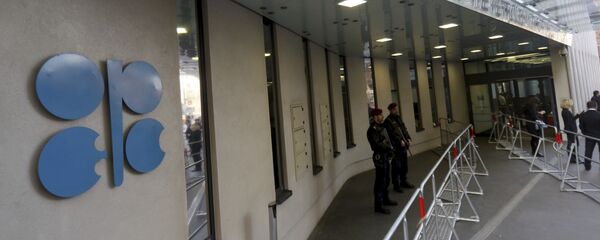Sputnik: How important is the OPEC-non-OPEC indefinite cooperation charter and what's its main significance?
Rajiv Biswas: This alliance between OPEC and non-OPEC producing countries, established since the end of 2016, has played quite an important role in helping to stabilize the oil market. We've seen the benefits of this cooperation coming through very recently with the decision made at the end of last year to cut production by 1.2 million barrels per day between OPEC and non-OPEC members during the first six months of this year. That really helped to stabilize the oil prices after a period since October last year, when they'd been falling quite sharply. So it's certainly contributed to supporting oil prices in a quite volatile global environment for oil.
Rajiv Biswas: I think the charter has established a framework for cooperation and it's also made it an ongoing process, so it's now becoming quite a well-established process that OPEC countries, together with a number of significant oil producers from non-OPEC countries, are meeting on a regular basis. What's also very important is that they are jointly monitoring the implementation of the cuts that have been agreed amongst the various countries that are part of this grouping. So I think overall, this has helped to take some oil out of the market at a time when oil prices had been weakening at the end of last year. What we've seen is that oil prices in the early part of this year have recovered some ground, not only because of this Vienna alliance cooperation, but also other factors, such as the impact of US sanctions on Iran and Venezuela, which have also taken a significant amount of oil out of world markets.
READ MORE: Egypt Not Considering Joining OPEC for Time Being — Petroleum Minister
Sputnik: What's the correlation in terms of this particular event and global prices; are we going to see rising prices, are we going to see stability, or will there be a reduction?
But what's offsetting this, and the reason why oil prices haven't moved even higher, is that US production has been growing very rapidly. There's been very substantial increases in US oil production during 2018, and further big increases are expected in 2019 and 2020 because the price of WTI in the US is now at a level which is supporting further development of US oil. So, US oil production, we think, will rise significantly from about 11.8 million barrels a day at the end of last year, to 13 million barrels a day by the end of 2019, and then further increases into 2020 as well. That's offsetting some of those factors that are reducing oil supplies, because of these very big increases in US production. Overall, that's keeping the oil market in balance so that the oil price is not going up too much more and neither is it coming down; so at the moment it's a balancing act with these offsetting forces.
Sputnik: What does OPEC's decision to cancel its April meeting mean for the oil markets moving forward?
Rajiv Biswas: I think that's just a near-term decision; I think the key point is that there will be a meeting of the OPEC and non-OPEC countries in Riyadh in May, so it's not a very big gap in between the meetings. The next OPEC ministerial meeting will be in June together with non-OPEC members as well, the Vienna alliance members. So I think there will be continuity and, of course, June will be very important, because those first six months, measures that were implemented since January to reduce oil production amongst the Vienna alliance will need to be then renewed or whatever decision they choose to make.
So that will be quite a critical meeting in June when they indicate what will happen in the second half of the year, whether they'll maintain those production cuts, whether they'll increase the production cuts even further, or whether they'll step back a bit. But the expectations are that the production cuts that have been agreed would continue on in the second half of the year, at the moment, anyway, that seems to be the likely outcome.
The views expressed in this article are those of the speaker and do not necessarily reflect those of Sputnik.






